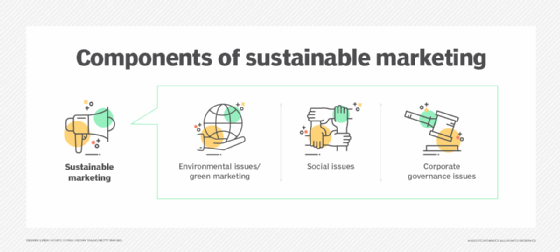
Getty Images/iStockphoto
How do green marketing and sustainable marketing differ?
Many organizations use green and sustainable marketing to build trust with consumers. Green marketing focuses on the environment, whereas sustainable marketing is broader.
Green and sustainable marketing center around corporate responsibility, but they differ in scope.
As consumers show increased interest in organizations' environmental and social practices, such as efforts to reduce carbon emissions and labor exploitation, many organizations have begun to change how they conduct business and market themselves. Some companies have adopted green marketing, which focuses on environmental protection. Other businesses have adopted sustainable marketing, which promotes an organization's support for both social and environmental causes.
Green and sustainable marketing can help organizations appeal to a growing base of environmentally and socially conscious consumers, employees and investors. Marketing leaders should understand the differences between green and sustainable marketing so they can create and launch the most effective campaigns for their target audiences.
Differences between green marketing and sustainable marketing
Although people sometimes use the terms interchangeably, green and sustainable marketing differ in scope. Green marketing is a branding strategy that focuses solely on organizations' efforts to protect the environment, while sustainable marketing can include efforts to address social and economic inequality, as well as environmental issues. In this sense, green marketing is a subset of sustainable marketing.
Green marketing, which has a longer history than sustainable marketing, originated in the 1970s in response to ecological degradation factors, like pollution and deforestation. This strategy became more prevalent in the 1980s as climate change awareness grew. Sustainable marketing, alternatively, originated after the United Nations released a series of reports between 2004 and 2008 that called for a greater focus on environmental, social and governance (ESG) issues from analysts, corporations and investors.
Both strategies require organizations to connect their brands to a greater purpose, but sustainable marketing came later and added social and governance factors to the mix.
Green marketing can use strategies like the following:
- Environmentally sustainable sourcing methods. Organizations that use green marketing often implement eco-friendly practices across the business to avoid greenwashing. For instance, people may accuse a toy company that talks about climate change on social media of greenwashing if it sources plastics from manufacturers that significantly pollute the environment. Effective green marketing often requires organizations to source materials from environmentally conscious manufacturers.
- Reduction of energy consumption. Organizations can lower their energy consumption to reduce their carbon footprints. To lower energy consumption, organizations may install Energy Star appliances, which meet the U.S. Environmental Protection Agency's energy efficiency standards. Organizations may also use more recycled materials.
Sustainable marketing can focus on environmental issues, too, but it can also include the following social practices:
- Partnerships with socially conscious manufacturers. International trade can involve issues like labor exploitation and poor working conditions. To avoid involvement with human rights issues, organizations could source products and materials only from manufacturers that meet certain ethical standards, such as those with fair trade certifications.
- Alignments with human rights organizations. For example, a human rights organization dedicated to reducing labor exploitation may call for increased supply chain transparency in the fashion industry to help consumers choose more socially conscious brands. To show customers and investors that it shares the same values as the human rights organization, a fashion company may publish the names and addresses of its factories.
As consumers and investors increasingly support organizations that share their moral values, green and sustainable marketing have become more critical to organizations' success. However, business leaders may not know how to effectively implement or measure sustainability initiatives. To do so, they should meet with sustainability consultants to ensure their efforts can make a difference.

What is green marketing?
Green marketing is the promotion of brands and products based on their perceived level of environmental sustainability. Organizations that use green marketing aim to link their products and services with a larger environmental mission, such as climate change, to improve brand loyalty with environmentally conscious consumers.
This type of marketing often focuses on specific steps organizations have taken to reduce their negative effects on the environment. For instance, a green marketing campaign may center on an organization's use of organic fibers in products or its investment in renewable energy.
Although green marketing campaigns can reflect genuine and effective efforts to reduce waste and carbon emissions, some organizations use them to make consumers believe they've taken steps to protect the environment when they haven't. This is known as greenwashing.
What is sustainable marketing?
Sustainable marketing is the promotion of brands and products based on their perceived level of ESG sustainability. This strategy focuses on social issues, such as discrimination and workplace conditions, in addition to environmental issues. Sustainable marketing also focuses on organizations' corporate governance policies, such as the disparity between CEO compensation and median employee pay.
Organizations that engage in sustainable marketing use initiatives, promotions and advertisements to connect their products and brands to larger environmental and social missions. More specifically, a sustainable marketing campaign may focus on steps an organization takes to affect social change, such as public advocacy for LGBTQ+ rights or improved healthcare for military veterans. These campaigns can help organizations build brand loyalty with environmentally and socially conscious consumers.
| Differences | Green marketing | Sustainable marketing |
| Definition | Promotion of brands based on environmental sustainability | Promotion of brands based on ESG factors |
| Goal | Increase loyalty among environmentally conscious consumers | Build loyalty among environmentally and socially conscious consumers |
| Examples | Use organic fibers, install sustainable appliances, invest in eco-friendly packaging | Partner with fair trade manufacturers, advocate for LGBTQ+ rights, improve workplace conditions |
Editor's note: This article was originally published in 2023. It was updated and expanded in 2025.
Tim Murphy is site editor for Informa TechTarget's SearchCustomerExperience and SearchContentManagement sites.








